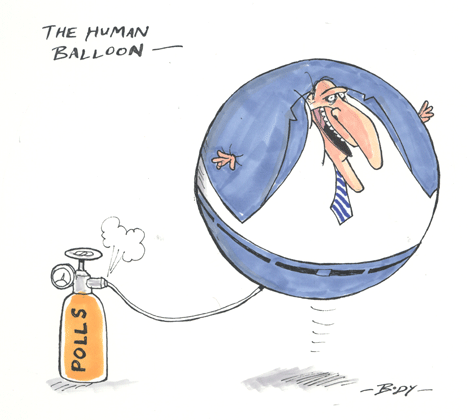
Here's my Top 10 links from around the Internet at 2 pm in association with NZ Mint.
I'll pop the extras into the comment stream. See all previous Top 10s here.
I welcome your additions in the comments below or via email to bernard.hickey@interest.co.nz.
This goes with my bearish party piece from last week.
1. Uruguayan disaster zone - Brian Gaynor rightly puts the boot into the Uruguayan farming disaster that was NZ Farming Systems, PGG Wrightson and the various directors involved for their appalling performance around the float and subsequent disastrous destruction of shareholder value.
Related party transactions abounded, strategy was abandoned and the usual hunt for capital gains on land ensued.
It details the worst of everything in some of New Zealand's business culture.
There is an argument we are mostly a nation of property developers, farmers and land speculators.
This exercise incapsulted the worst of all these things.
And it was done on the NZX.
Retail investors were big losers again.
Here's Gaynor's well directed placement of his steel capped footwear:
NZS may not have successfully introduced our farming practices to Uruguay but it managed to introduce New Zealanders' strategy of acquiring highly leveraged farm land with the intention of making a large, non-taxable capital profit on disposal.
This accelerated land purchase programme benefited PGG Wrightson because its management fee was based on the company's gross asset value with a charge of 1.5 per cent per annum up to June 30, 2008, and 1 per cent after that.
Why did NZS switch from a profit-orientated plan to a land acquisition strategy when the clear emphasis in the prospectus was on profitability?
2. 'Ya don't say' - The Financial Post reports the UN's economics division has warned of a crisis of confidence in the US dollar, or even a collapse. HT Cosmic via email.
No wonder our currency is at 82 USc, although it's also stronger against the Australian dollar.
In a mid-year review of the world economy, the UN economic division said such a development, stemming from the falling value of foreign dollar holdings, would imperil the global financial system.
This trend, it said, had recently been driven in part by interest rate differentials between the United States and other major economies and growing concern about the sustainability of the U.S. public debt, half of which is held by foreigners.
“As a result, further (expected) losses of the book value of the vast foreign reserve holdings could trigger a crisis of confidence in the reserve currency, which would put the entire global financial system at risk,” it said.
The 17-page report referred at another point to the “still looming risk of a collapse of the United States dollar.”
3. Never ending demand - Bloomberg reports China's demand for steel may rise as much as 25% by 2015, the main industry body says.
Cue strong demand for Australian iron ore and coal.
4. Some sensible advice - Bloomberg reports US Federal Reserve rebel Thomas Hoenig saying the Fed needs to hike interest rates to encourage saving.
What a good idea.
Wish our Reserve Bank would do such a thing.
“I’m not advocating for tight monetary policy, but I do think we have to get off of zero if we want to avoid repeating some of the mistakes of the past with a very easy credit environment,” Hoenig said in an interview on CNN’s “Fareed Zakaria GPS.
The Fed under Chairman Alan Greenspan kept interest rates at 2 percent or less from December 2001 to December 2004. The savings rate averaged about 3.4 percent during that period, compared with 5.4 percent in the previous two decades, and fell to 0.8 percent in 2005, the lowest level since at least 1959, according to Commerce Department data. Defaults on home loans to the riskiest borrowers in 2007 and 2008 triggered the worst recession and financial crisis since the 1930s.
“We kept the interest rates too low,” Hoenig, who served on the Federal Open Market Committee that sets interest rates, said of those years in the CNN interview. “It’s not that I want to point blame to myself or anyone else, but I do have to say this is what happened, what were the consequences and what have I learned from it and -- and adjust policy the next time going forward.”
5. Some good news - Bloomberg reports Russia has ended a ban on grain exports after a recovery in its harvest. The ban imposed last year was a factor in boosting wheat prices globally.
While international prices may decline on the resumption of Russian exports, domestic prices will likely jump, SovEcon Managing Director Andrey Sizov Jr. said yesterday. That may spur the government to restrict sales again later in the year, he said.
The jump in world food prices means inflation is accelerating around the world, spurring at least two dozen central banks and the European Central Bank to raise interest rates this year, data compiled by Bloomberg show. Higher interest rates may curb global economic growth the Organization for Economic Cooperation and Development said May 25 would rise to 4.6 percent next year from 4.2 percent this year.
5. Negative real interest rates - Why would anybody save when interest rates are this low and the inflation rate is higher? See more here.
6. Money shredder - Mashable reports someone is selling an alarm clock in America that shreds money if you don't turn it off quickly enough.
I suspect the people at the US Federal Reserve arn't worried too much about this...can easily be fixed with more printing.
7. Greek takeover - The FT reports (via Zerohedge) this morning that the European Union plans to get involved directly in taxing Greek citizens to ensure they don't avoid taxes any more.
I can't see this being allowed by the good citizens of Greece.
How would we feel if the IMF started doing the IRD's job here?
European leaders are negotiating a deal that would lead to unprecedented outside intervention in the Greek economy, including international involvement in tax collection and privatisation of state assets, in exchange for new bail-out loans for Athens.
People involved in the talks said the package would also include incentives for private holders of Greek debt voluntarily to extend Athens’ repayment schedule, as well as another round of austerity measures.
8. 10 reasons why China is different - Morgan Stanley economist Stephen Roach gives 10 reasons at Project Syndicate explaining why he thinks the China doubters are wrong.
China has a 50% savings rate. Say no more.
Unlike the West, where the very concept of strategy has become an oxymoron, China has embraced a transitional framework aimed at resolving its sustainability constraints. Moreover, unlike the West, which is trapped in a dysfunctional political quagmire, China has both the commitment and the wherewithal to deliver on that strategy. This is not a time to bet against China.
Saving. A domestic saving rate in excess of 50% has served China well. It funded the investment imperatives of economic development and boosted the cushion of foreign-exchange reserves that has shielded China from external shocks. China now stands ready to absorb some of that surplus saving to promote a shift toward internal demand.
9. 'Deflation in all you own, inflation in all you need' - HT Houses and Holes over at Macrobusiness for spotting this SG analysis of Chinese inflation.
Looks interesting.
The proportion of China’s inflation that is structurally determined has ratcheted higher over previous expansionary cycles. Indeed China’s ambitious 12th Five-Year Plan is inherently inflationary. Inflation is the natural consequence of rebalancing. These developments have profound global consequences. The enormous outward shift in the global economy’s supply curve that came with China’s WTO accession and the army of millions of workers it added to the global labour force has come to an end.
A better balance of expenditures in the Chinese economy will engineer an outward shift in the global demand curve. In the post-crisis world we would suggest that the global supply curve has become more inelastic. That is, it has steepened and has a lower propensity to shift out further.
Hence, the faster China rebalances, the greater the inflation it will generate.
10. Totally Too Big To Fail - Here's the movie condensed to 80 seconds. There are a lot of numbers. And some swear words.
16 Comments
Walter 2009 - US$ collapsing – no – no – no – it cannot happen – who told you that nonsense ???
Uruguay is an interesting choice for dairy farming. The price of land did drop 50% after the Argentine crash. However, Uruguay's climate is more like northern NSW, it gets pretty hot in summer. A prolonged drought didn't help either. It strikes me as more suitable as beef country.
Oh Walter – another of your crazy predictions
I personally think world problems are not only accumulation, but accelerating on many fronts to an extent that solution findings should not be lead by politicians, policymakers, bankers, lawyers etc. but by philosophers.
My prediction for the next 10 years: Climate change/ natural events combined with mismanagement of economies and greed will financially ruin economies/ societies with severe political consequences.
Walter - don't be so bloody - .....– it is all fine.
Has Hoenig been reading my posts?
Another reason NZ is not doing so well:
http://www.stuff.co.nz/the-press/business/5067629/Export-agency-rates-poorly-in-review
http://www.nzte.govt.nz/about-nzte/our-people/pages/board-members.aspx
What's missing from this story?
http://www.stuff.co.nz/the-press/opinion/5062870/Daily-grind-taxing-for-the-dairy-farmer
It doesn't mention the risk to the economic system and to dairy farming of peak oil . Nor does it address the looming risk of global warming . IMHO .
regards
A violin playing in the background?
Heh heh ....... Good one !
....... and there was no mention of the Filippino guys , the ones who do the actual hard work , you know , those poor sods who do get up at 4 am , and who work through til 8 pm !
... and no mention of phone calls to three professionals who make this all possible, if Stuart Nash is to be believed.
Three guesses then Rog?
L O L!
BEST. COMMENT. EVAR!
Where the author's remuneration came from?
Bernard, Wolly - #4, indeed, by RB specifying and varying the fraction of domestic to foreign funds. It would work against the moral hazard banks face with high proportions of foreign funds (better that NZD high and getting higher); helps NZ savers; reduces foreign debt; stops banks neutralising RB tightening policy by importing loose policy from elsewhere.
Why not?
No one has worried about mad cow disease for a while.....
what if we get peak oil and mad cow disease - AT THE SAME TIME???
If some cocky with cold hands grabbed my tits at 4 in the morning I'd be a bloody mad cow too ..... It's not a disease , it's a ruddy protest !
SK
http://permaculture.org.au/2011/05/04/iea-concedes-that-peak-oil-alread…
You're a bit behind the times (and you'll find that folk like me were warning about it before that).
That bit about no crapping in the waterways is cowshit too, Pure hype - disprovable by looking at ANY Regional Council records.....










We welcome your comments below. If you are not already registered, please register to comment
Remember we welcome robust, respectful and insightful debate. We don't welcome abusive or defamatory comments and will de-register those repeatedly making such comments. Our current comment policy is here.